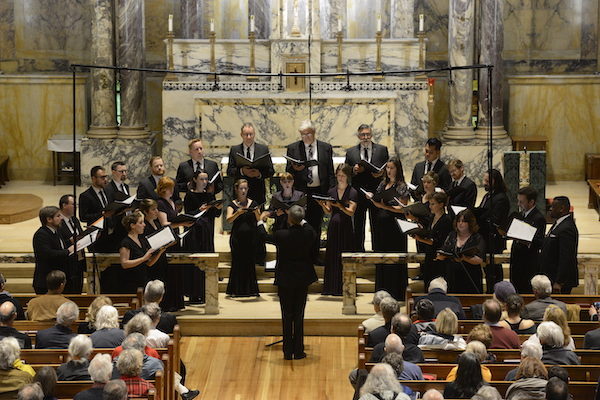Concert Review: Skylark’s Rachmaninoff’s Vespers a.k.a. All-Night Vigil — A Beautiful Benediction
By Susan Miron
Skylark continues to impress me with its distinctly beautiful sound, its dazzling control over dynamics and intonation, and its unusually compelling programming.

Skylark performing “Rachmaninoff’s Vespers/All -Night Vigil.” Photo: Eric Antoniou.
Some concerts are so deeply moving that they act as a balm, traveling straight from the stage to your heart. Such was Sunday’s concert by Skylark performing Rachmaninoff Vespers a.k.a. All-Night Vigil under its artistic director Matthew Guard.
It was a performance that, even judged by this outstanding ensemble’s customary standard, was unusually brilliant. I have been a fan of the choral ensemble ever since I began attending its concerts four years ago. On Sunday, at St. Peter’s Church in Cambridge, Skylark added three world-class bass singers to its lineup — and their vocal input was simply ear-boggling. I have never heard such low notes sung so well — and with pitches that resonated with the power of an organ.
Twenty-two Skylark singers participated in performing a piece whose very low parts are usually performed, with much less drama, by a chorus’s bass section. Two soloists, tenor Jonas Budris (in beautiful voice) and mezzo-soprano Luthien Bracket (from the Monteverdi Choir in the U.K.), made exquisite contributions. The talents of three renowned basses — Eric Alatorre, Glenn Miller, and Adrian Peacock — also powered this concert to success. The Vespers rendered by way of Skylark’s profundo version is a rarity. There will most likely not be another chance for concertgoers to hear it. Though who knows? The work seems, in the Boston area, to becoming quite popular. (Some audience members were vocal in hoping that Skylark and the three basso profundos record this work.) Originally based both here and in Atlanta, Skylark (founded in 2011) has, over the last couple of seasons, centered most of its activities around the greater Boston area, largely avoiding metro Boston. Guard has focused on taking the group to the city’s outskirts, from Falmouth on the Cape (where they rehearse intensively for a few days before each concert) and Newburyport to Chestnut Hill and Cambridge.
Rachmaninoff Vespers/All-Night Vigil is a culmination of the preceding two decades of interest by Russian composers in sacred music, which began with Tchaikovsky’s setting of All-Night Vigil (1881-82). The All-Night Vigil’s hour or so of music was written by Rachmaninoff in just two weeks, in early 1915, when the composer was 41 (he had already established himself as a brilliant concert pianist, conductor, and creator of two symphonies and three operas, as well as numerous piano pieces and songs). An overnight success in wartime Russia, the piece was first presented in March of 1915 in Moscow, as a benefit for war relief, and was quickly followed by four more performances. But when the Bolshevik Revolution brought the Communist regime into power, the piece, along with other Russian Orthodox music, was banned; the work was not performed until the Soviet Union collapsed in 1991. Like all traditional Russian church music, it is a cappella; instruments are not permitted in Orthodox services. The text is in Church Slavonic, the liturgical language of the Orthodox Church.
The title of the work is often mistranslated as simply Vespers. This is both literally and conceptually incorrect; only the first six of its 15 movements set texts from the Russian Orthodox canonical hour of Vespers. The religious service itself combines three canonical hours — Vespers, Matins, and the First Hour — into one work. It is celebrated on the eves of Sundays and of major liturgical feasts. A full religious service, including the music, does, in fact, take all night.
Rachmaninoff set the 12 traditional parts of the Vigil to music and added three movements of his own (Nos. 12, 13, and 14), which, in his words, he fashioned “in a conscious counterfeit of the ritual.” He made creative use of traditional church chants, using three styles: znamenny (in Nos. 8, 9, 12, 13, and 14), a more recitational “Greek” style (Nos. 2 and 15), and the “Kiev” chant — a chant developed in the 16th and 17th centuries (Nos. 4 and 5). Rachmaninoff had studied ancient chant under Stepan Smolensky, to whom he dedicated the piece. The All-Night Vigil is written for a four-part choir, including basso profundo. However, many sections feature three-, five-, six-, or eight-part harmony. At one point, in the seventh movement, the choir is divided into 11 parts. Movements 4 and 9 each contain a brief tenor solo, while movements 2 and 5 feature lengthy solos respectively for alto and tenor. The fifth section, the Russian Slavonic setting of the “Nunc dimittis,” was Rachmaninoff’s favorite. He wanted it to be sung at his funeral. Alas, by then he was in exile, where true Russian basses were unavailable: “as rare as asparagus at Christmas!”
Skylark continues to impress me with its distinctly beautiful sound, its dazzling control over dynamics and intonation, and its unusually compelling programming.
Susan Miron, a harpist, has been a book reviewer for over 30 years for a large variety of literary publications and newspapers. Her fields of expertise were East and Central European, Irish, and Israeli literature. Susan covers classical music for The Arts Fuse and The Boston Musical Intelligencer.

